Comprehensive Analysis: Entrepreneurship and Small Business Mgmt
VerifiedAdded on 2023/01/10
|15
|4146
|24
Essay
AI Summary
This essay provides a comprehensive analysis of entrepreneurship and small business management, exploring various entrepreneurial ventures and typologies, including small company, social, large company, and scalable ventures. It highlights the similarities and differences between these ventures, focusing on goals, risks, employee structure, and organizational forms. The study also examines the impact of micro and small businesses on the economy, referencing UK statistics and emphasizing their role in GDP contribution and job creation. Furthermore, it discusses the importance of startups for economic growth, their focus on consumer satisfaction, and their involvement in corporate social responsibility. The essay concludes by comparing the contributions of small, medium, and large businesses to the economy and emphasizing the positive impact of small businesses on regional development. Desklib offers more resources and study tools for students.

Entrepreneurship and Small Business Management
Paraphrase This Document
Need a fresh take? Get an instant paraphrase of this document with our AI Paraphraser
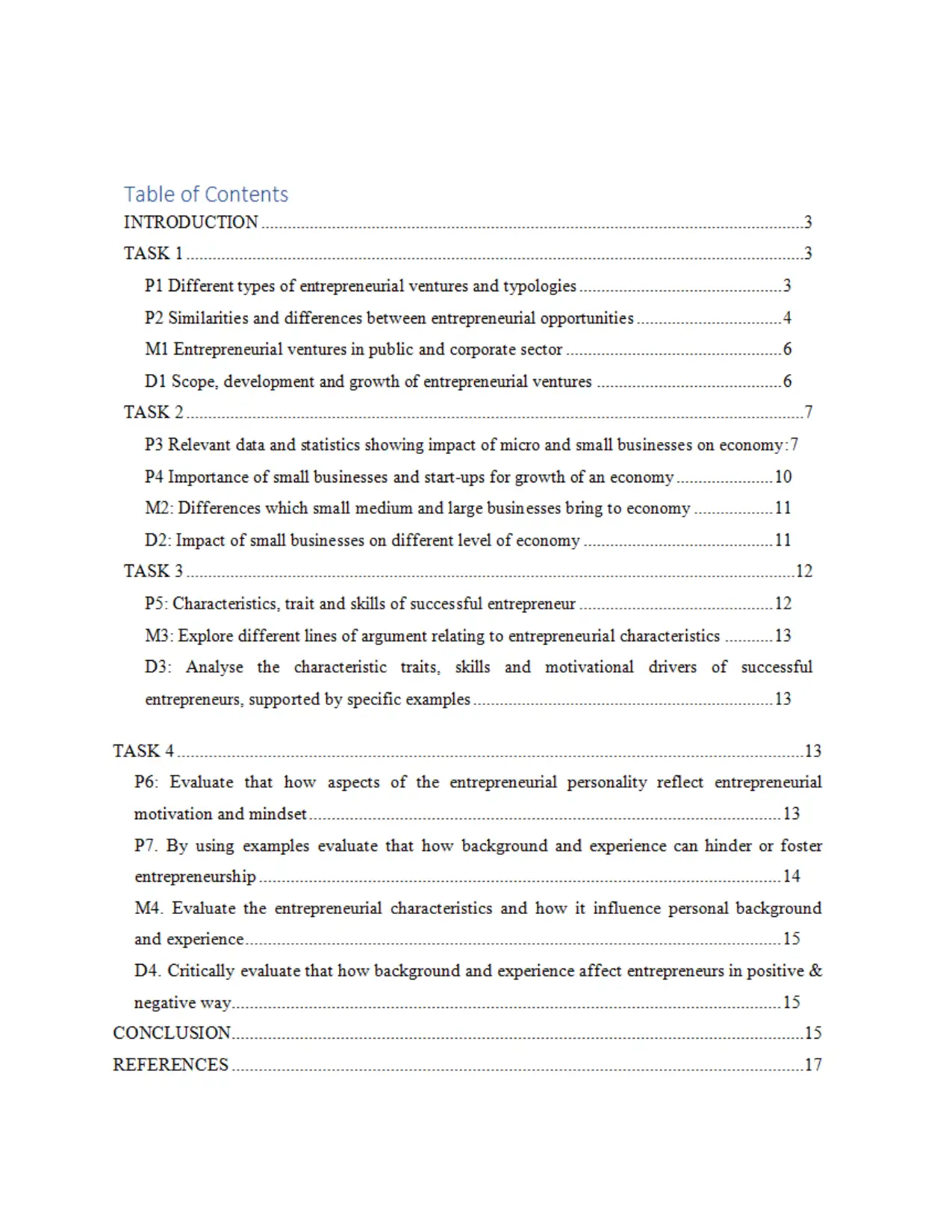
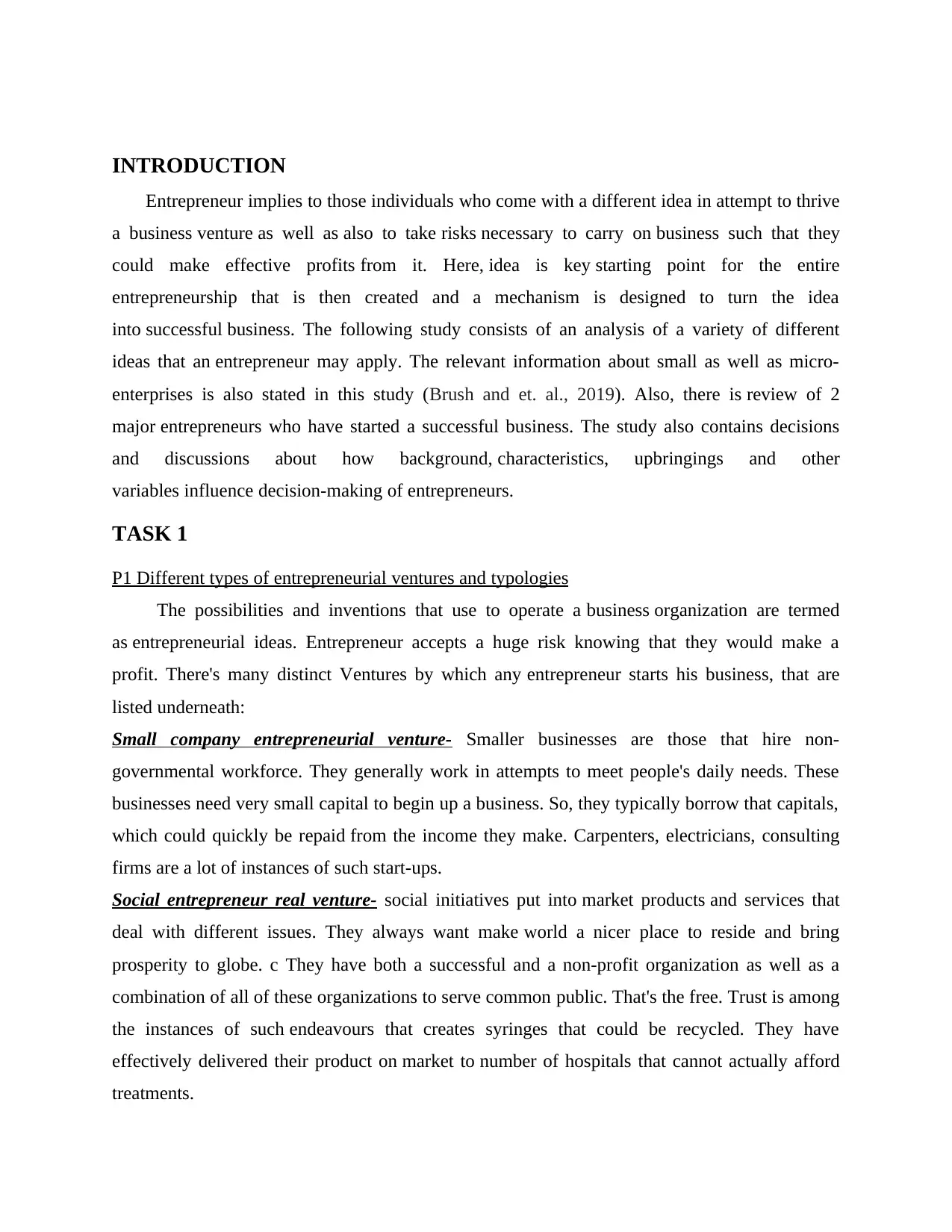
INTRODUCTION
Entrepreneur implies to those individuals who come with a different idea in attempt to thrive
a business venture as well as also to take risks necessary to carry on business such that they
could make effective profits from it. Here, idea is key starting point for the entire
entrepreneurship that is then created and a mechanism is designed to turn the idea
into successful business. The following study consists of an analysis of a variety of different
ideas that an entrepreneur may apply. The relevant information about small as well as micro-
enterprises is also stated in this study (Brush and et. al., 2019). Also, there is review of 2
major entrepreneurs who have started a successful business. The study also contains decisions
and discussions about how background, characteristics, upbringings and other
variables influence decision-making of entrepreneurs.
TASK 1
P1 Different types of entrepreneurial ventures and typologies
The possibilities and inventions that use to operate a business organization are termed
as entrepreneurial ideas. Entrepreneur accepts a huge risk knowing that they would make a
profit. There's many distinct Ventures by which any entrepreneur starts his business, that are
listed underneath:
Small company entrepreneurial venture- Smaller businesses are those that hire non-
governmental workforce. They generally work in attempts to meet people's daily needs. These
businesses need very small capital to begin up a business. So, they typically borrow that capitals,
which could quickly be repaid from the income they make. Carpenters, electricians, consulting
firms are a lot of instances of such start-ups.
Social entrepreneur real venture- social initiatives put into market products and services that
deal with different issues. They always want make world a nicer place to reside and bring
prosperity to globe. c They have both a successful and a non-profit organization as well as a
combination of all of these organizations to serve common public. That's the free. Trust is among
the instances of such endeavours that creates syringes that could be recycled. They have
effectively delivered their product on market to number of hospitals that cannot actually afford
treatments.
Entrepreneur implies to those individuals who come with a different idea in attempt to thrive
a business venture as well as also to take risks necessary to carry on business such that they
could make effective profits from it. Here, idea is key starting point for the entire
entrepreneurship that is then created and a mechanism is designed to turn the idea
into successful business. The following study consists of an analysis of a variety of different
ideas that an entrepreneur may apply. The relevant information about small as well as micro-
enterprises is also stated in this study (Brush and et. al., 2019). Also, there is review of 2
major entrepreneurs who have started a successful business. The study also contains decisions
and discussions about how background, characteristics, upbringings and other
variables influence decision-making of entrepreneurs.
TASK 1
P1 Different types of entrepreneurial ventures and typologies
The possibilities and inventions that use to operate a business organization are termed
as entrepreneurial ideas. Entrepreneur accepts a huge risk knowing that they would make a
profit. There's many distinct Ventures by which any entrepreneur starts his business, that are
listed underneath:
Small company entrepreneurial venture- Smaller businesses are those that hire non-
governmental workforce. They generally work in attempts to meet people's daily needs. These
businesses need very small capital to begin up a business. So, they typically borrow that capitals,
which could quickly be repaid from the income they make. Carpenters, electricians, consulting
firms are a lot of instances of such start-ups.
Social entrepreneur real venture- social initiatives put into market products and services that
deal with different issues. They always want make world a nicer place to reside and bring
prosperity to globe. c They have both a successful and a non-profit organization as well as a
combination of all of these organizations to serve common public. That's the free. Trust is among
the instances of such endeavours that creates syringes that could be recycled. They have
effectively delivered their product on market to number of hospitals that cannot actually afford
treatments.
⊘ This is a preview!⊘
Do you want full access?
Subscribe today to unlock all pages.

Trusted by 1+ million students worldwide
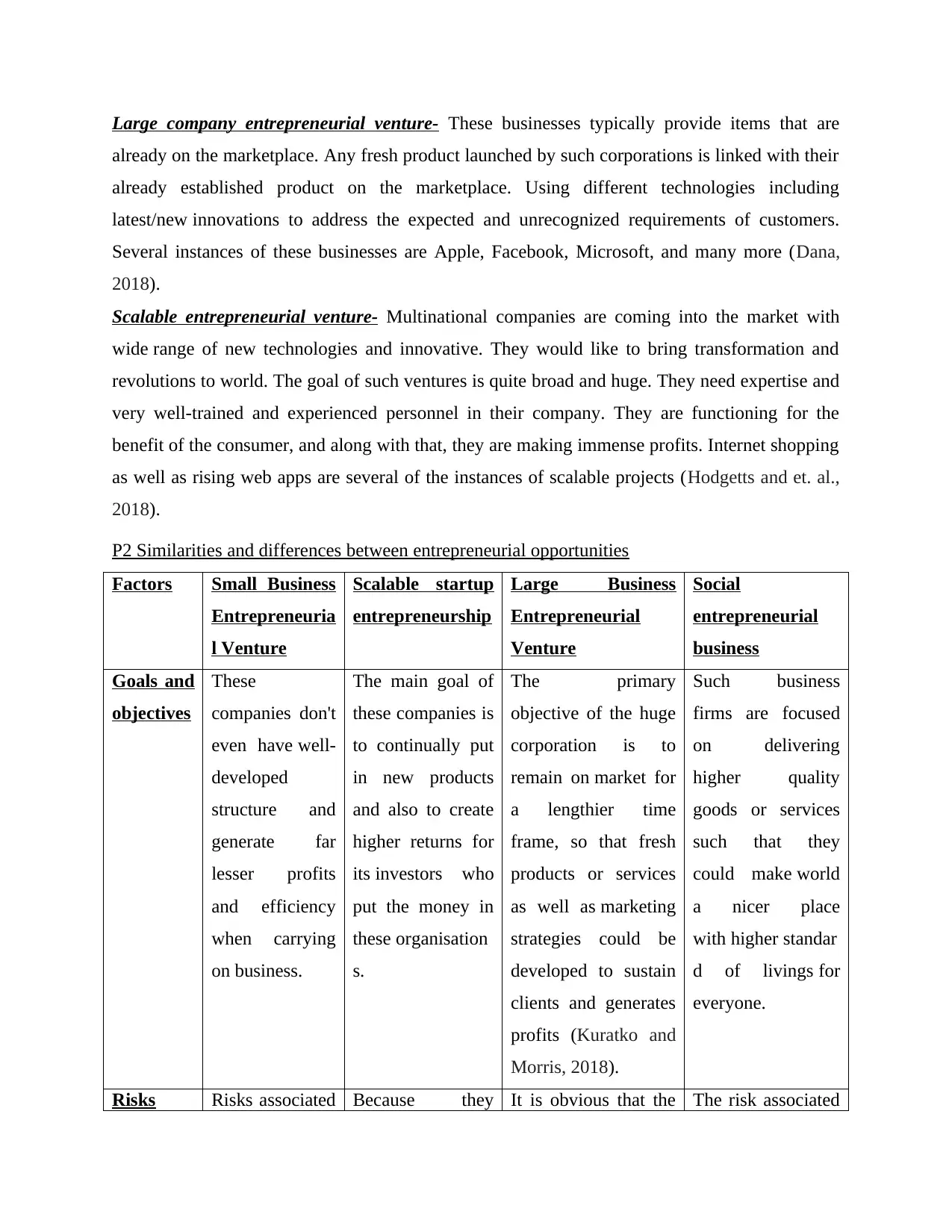
Large company entrepreneurial venture- These businesses typically provide items that are
already on the marketplace. Any fresh product launched by such corporations is linked with their
already established product on the marketplace. Using different technologies including
latest/new innovations to address the expected and unrecognized requirements of customers.
Several instances of these businesses are Apple, Facebook, Microsoft, and many more (Dana,
2018).
Scalable entrepreneurial venture- Multinational companies are coming into the market with
wide range of new technologies and innovative. They would like to bring transformation and
revolutions to world. The goal of such ventures is quite broad and huge. They need expertise and
very well-trained and experienced personnel in their company. They are functioning for the
benefit of the consumer, and along with that, they are making immense profits. Internet shopping
as well as rising web apps are several of the instances of scalable projects (Hodgetts and et. al.,
2018).
P2 Similarities and differences between entrepreneurial opportunities
Factors Small Business
Entrepreneuria
l Venture
Scalable startup
entrepreneurship
Large Business
Entrepreneurial
Venture
Social
entrepreneurial
business
Goals and
objectives
These
companies don't
even have well-
developed
structure and
generate far
lesser profits
and efficiency
when carrying
on business.
The main goal of
these companies is
to continually put
in new products
and also to create
higher returns for
its investors who
put the money in
these organisation
s.
The primary
objective of the huge
corporation is to
remain on market for
a lengthier time
frame, so that fresh
products or services
as well as marketing
strategies could be
developed to sustain
clients and generates
profits (Kuratko and
Morris, 2018).
Such business
firms are focused
on delivering
higher quality
goods or services
such that they
could make world
a nicer place
with higher standar
d of livings for
everyone.
Risks Risks associated Because they It is obvious that the The risk associated
already on the marketplace. Any fresh product launched by such corporations is linked with their
already established product on the marketplace. Using different technologies including
latest/new innovations to address the expected and unrecognized requirements of customers.
Several instances of these businesses are Apple, Facebook, Microsoft, and many more (Dana,
2018).
Scalable entrepreneurial venture- Multinational companies are coming into the market with
wide range of new technologies and innovative. They would like to bring transformation and
revolutions to world. The goal of such ventures is quite broad and huge. They need expertise and
very well-trained and experienced personnel in their company. They are functioning for the
benefit of the consumer, and along with that, they are making immense profits. Internet shopping
as well as rising web apps are several of the instances of scalable projects (Hodgetts and et. al.,
2018).
P2 Similarities and differences between entrepreneurial opportunities
Factors Small Business
Entrepreneuria
l Venture
Scalable startup
entrepreneurship
Large Business
Entrepreneurial
Venture
Social
entrepreneurial
business
Goals and
objectives
These
companies don't
even have well-
developed
structure and
generate far
lesser profits
and efficiency
when carrying
on business.
The main goal of
these companies is
to continually put
in new products
and also to create
higher returns for
its investors who
put the money in
these organisation
s.
The primary
objective of the huge
corporation is to
remain on market for
a lengthier time
frame, so that fresh
products or services
as well as marketing
strategies could be
developed to sustain
clients and generates
profits (Kuratko and
Morris, 2018).
Such business
firms are focused
on delivering
higher quality
goods or services
such that they
could make world
a nicer place
with higher standar
d of livings for
everyone.
Risks Risks associated Because they It is obvious that the The risk associated
Paraphrase This Document
Need a fresh take? Get an instant paraphrase of this document with our AI Paraphraser
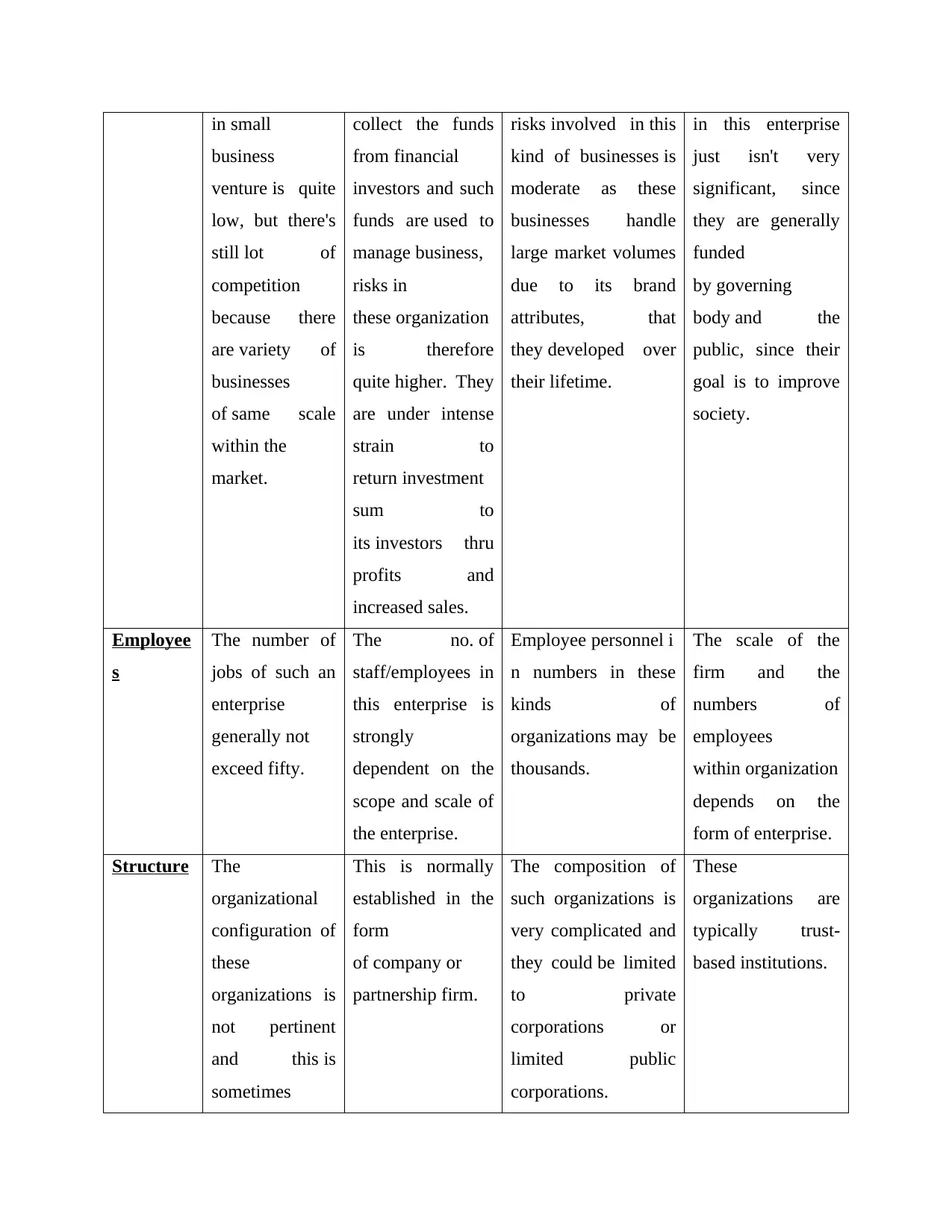
in small
business
venture is quite
low, but there's
still lot of
competition
because there
are variety of
businesses
of same scale
within the
market.
collect the funds
from financial
investors and such
funds are used to
manage business,
risks in
these organization
is therefore
quite higher. They
are under intense
strain to
return investment
sum to
its investors thru
profits and
increased sales.
risks involved in this
kind of businesses is
moderate as these
businesses handle
large market volumes
due to its brand
attributes, that
they developed over
their lifetime.
in this enterprise
just isn't very
significant, since
they are generally
funded
by governing
body and the
public, since their
goal is to improve
society.
Employee
s
The number of
jobs of such an
enterprise
generally not
exceed fifty.
The no. of
staff/employees in
this enterprise is
strongly
dependent on the
scope and scale of
the enterprise.
Employee personnel i
n numbers in these
kinds of
organizations may be
thousands.
The scale of the
firm and the
numbers of
employees
within organization
depends on the
form of enterprise.
Structure The
organizational
configuration of
these
organizations is
not pertinent
and this is
sometimes
This is normally
established in the
form
of company or
partnership firm.
The composition of
such organizations is
very complicated and
they could be limited
to private
corporations or
limited public
corporations.
These
organizations are
typically trust-
based institutions.
business
venture is quite
low, but there's
still lot of
competition
because there
are variety of
businesses
of same scale
within the
market.
collect the funds
from financial
investors and such
funds are used to
manage business,
risks in
these organization
is therefore
quite higher. They
are under intense
strain to
return investment
sum to
its investors thru
profits and
increased sales.
risks involved in this
kind of businesses is
moderate as these
businesses handle
large market volumes
due to its brand
attributes, that
they developed over
their lifetime.
in this enterprise
just isn't very
significant, since
they are generally
funded
by governing
body and the
public, since their
goal is to improve
society.
Employee
s
The number of
jobs of such an
enterprise
generally not
exceed fifty.
The no. of
staff/employees in
this enterprise is
strongly
dependent on the
scope and scale of
the enterprise.
Employee personnel i
n numbers in these
kinds of
organizations may be
thousands.
The scale of the
firm and the
numbers of
employees
within organization
depends on the
form of enterprise.
Structure The
organizational
configuration of
these
organizations is
not pertinent
and this is
sometimes
This is normally
established in the
form
of company or
partnership firm.
The composition of
such organizations is
very complicated and
they could be limited
to private
corporations or
limited public
corporations.
These
organizations are
typically trust-
based institutions.
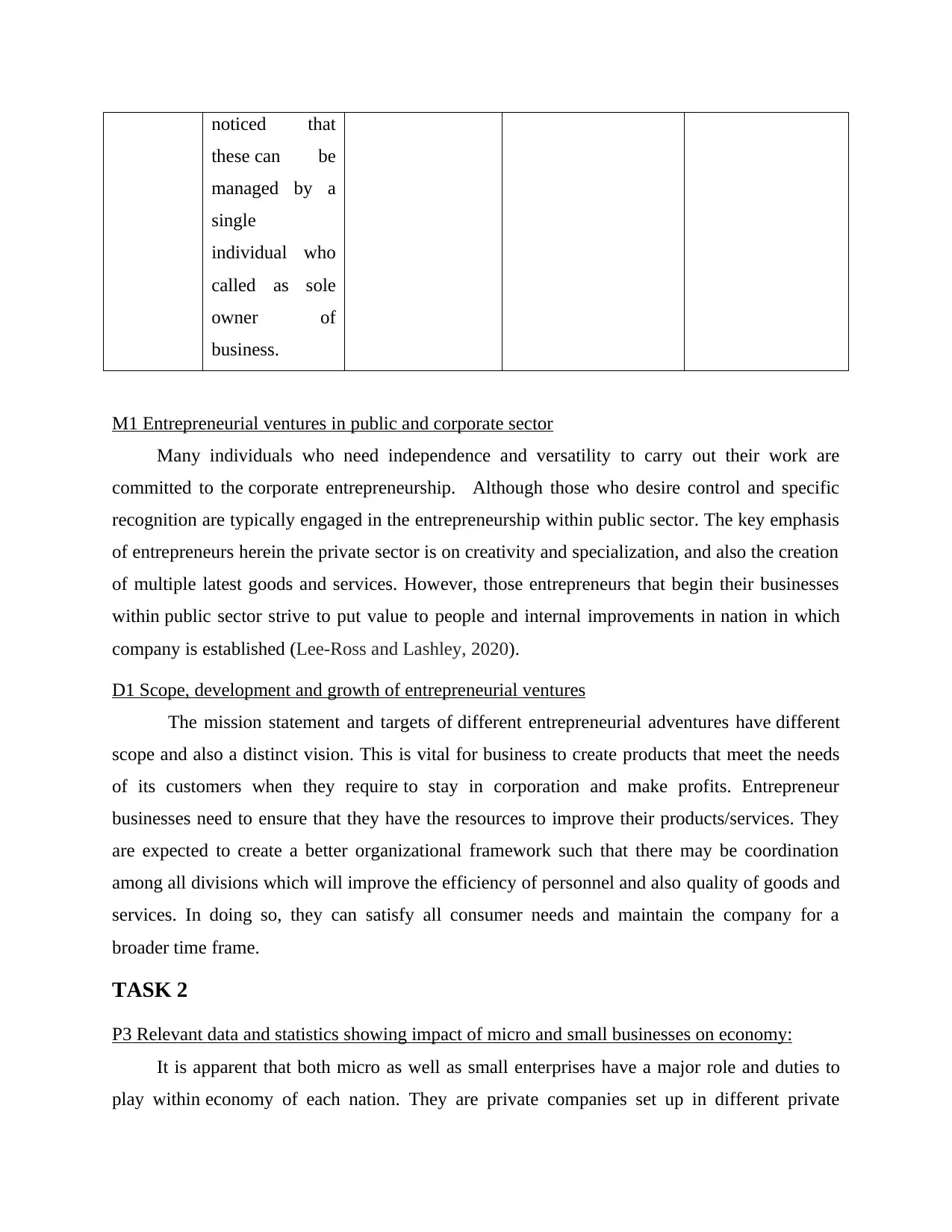
noticed that
these can be
managed by a
single
individual who
called as sole
owner of
business.
M1 Entrepreneurial ventures in public and corporate sector
Many individuals who need independence and versatility to carry out their work are
committed to the corporate entrepreneurship. Although those who desire control and specific
recognition are typically engaged in the entrepreneurship within public sector. The key emphasis
of entrepreneurs herein the private sector is on creativity and specialization, and also the creation
of multiple latest goods and services. However, those entrepreneurs that begin their businesses
within public sector strive to put value to people and internal improvements in nation in which
company is established (Lee-Ross and Lashley, 2020).
D1 Scope, development and growth of entrepreneurial ventures
The mission statement and targets of different entrepreneurial adventures have different
scope and also a distinct vision. This is vital for business to create products that meet the needs
of its customers when they require to stay in corporation and make profits. Entrepreneur
businesses need to ensure that they have the resources to improve their products/services. They
are expected to create a better organizational framework such that there may be coordination
among all divisions which will improve the efficiency of personnel and also quality of goods and
services. In doing so, they can satisfy all consumer needs and maintain the company for a
broader time frame.
TASK 2
P3 Relevant data and statistics showing impact of micro and small businesses on economy:
It is apparent that both micro as well as small enterprises have a major role and duties to
play within economy of each nation. They are private companies set up in different private
these can be
managed by a
single
individual who
called as sole
owner of
business.
M1 Entrepreneurial ventures in public and corporate sector
Many individuals who need independence and versatility to carry out their work are
committed to the corporate entrepreneurship. Although those who desire control and specific
recognition are typically engaged in the entrepreneurship within public sector. The key emphasis
of entrepreneurs herein the private sector is on creativity and specialization, and also the creation
of multiple latest goods and services. However, those entrepreneurs that begin their businesses
within public sector strive to put value to people and internal improvements in nation in which
company is established (Lee-Ross and Lashley, 2020).
D1 Scope, development and growth of entrepreneurial ventures
The mission statement and targets of different entrepreneurial adventures have different
scope and also a distinct vision. This is vital for business to create products that meet the needs
of its customers when they require to stay in corporation and make profits. Entrepreneur
businesses need to ensure that they have the resources to improve their products/services. They
are expected to create a better organizational framework such that there may be coordination
among all divisions which will improve the efficiency of personnel and also quality of goods and
services. In doing so, they can satisfy all consumer needs and maintain the company for a
broader time frame.
TASK 2
P3 Relevant data and statistics showing impact of micro and small businesses on economy:
It is apparent that both micro as well as small enterprises have a major role and duties to
play within economy of each nation. They are private companies set up in different private
⊘ This is a preview!⊘
Do you want full access?
Subscribe today to unlock all pages.

Trusted by 1+ million students worldwide
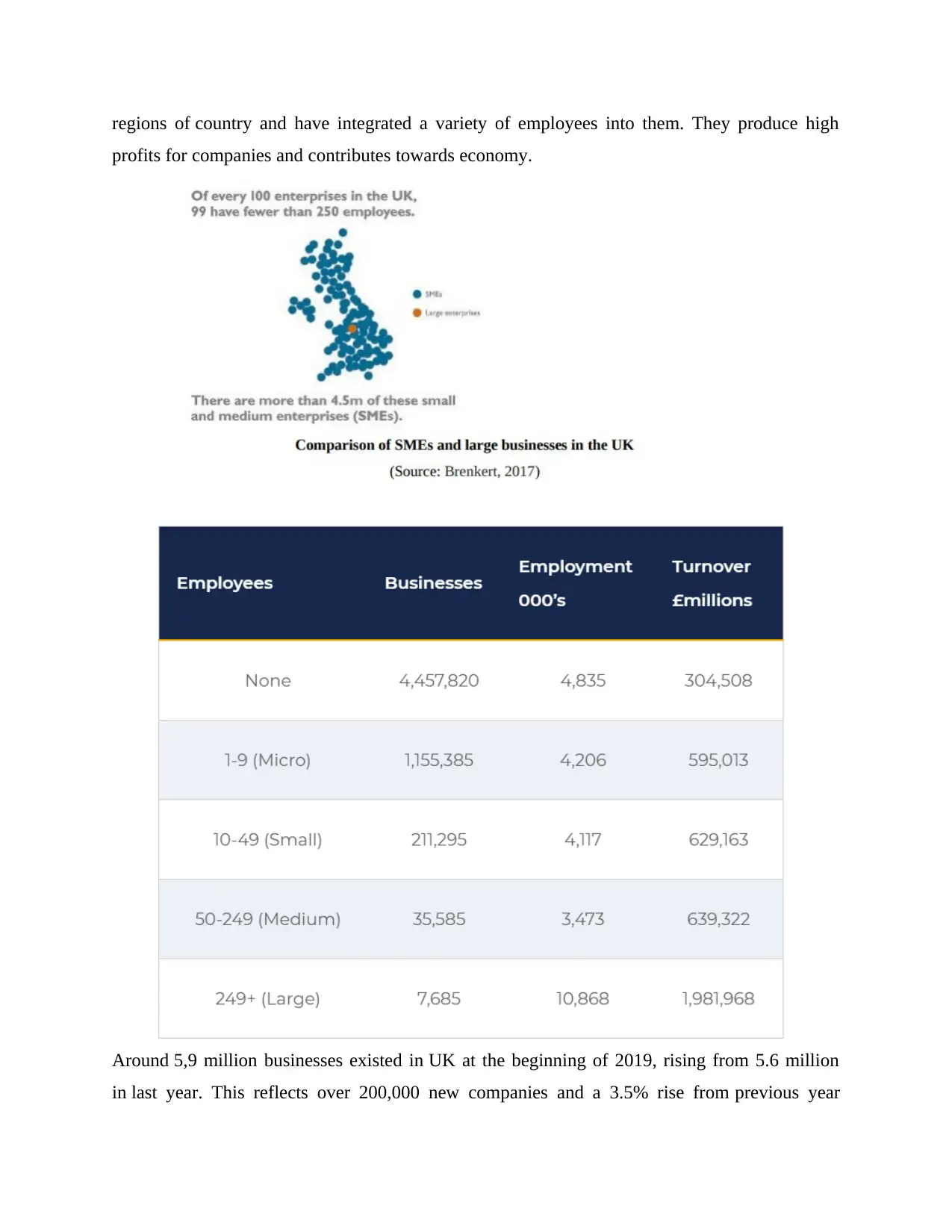
regions of country and have integrated a variety of employees into them. They produce high
profits for companies and contributes towards economy.
Around 5,9 million businesses existed in UK at the beginning of 2019, rising from 5.6 million
in last year. This reflects over 200,000 new companies and a 3.5% rise from previous year
profits for companies and contributes towards economy.
Around 5,9 million businesses existed in UK at the beginning of 2019, rising from 5.6 million
in last year. This reflects over 200,000 new companies and a 3.5% rise from previous year
Paraphrase This Document
Need a fresh take? Get an instant paraphrase of this document with our AI Paraphraser
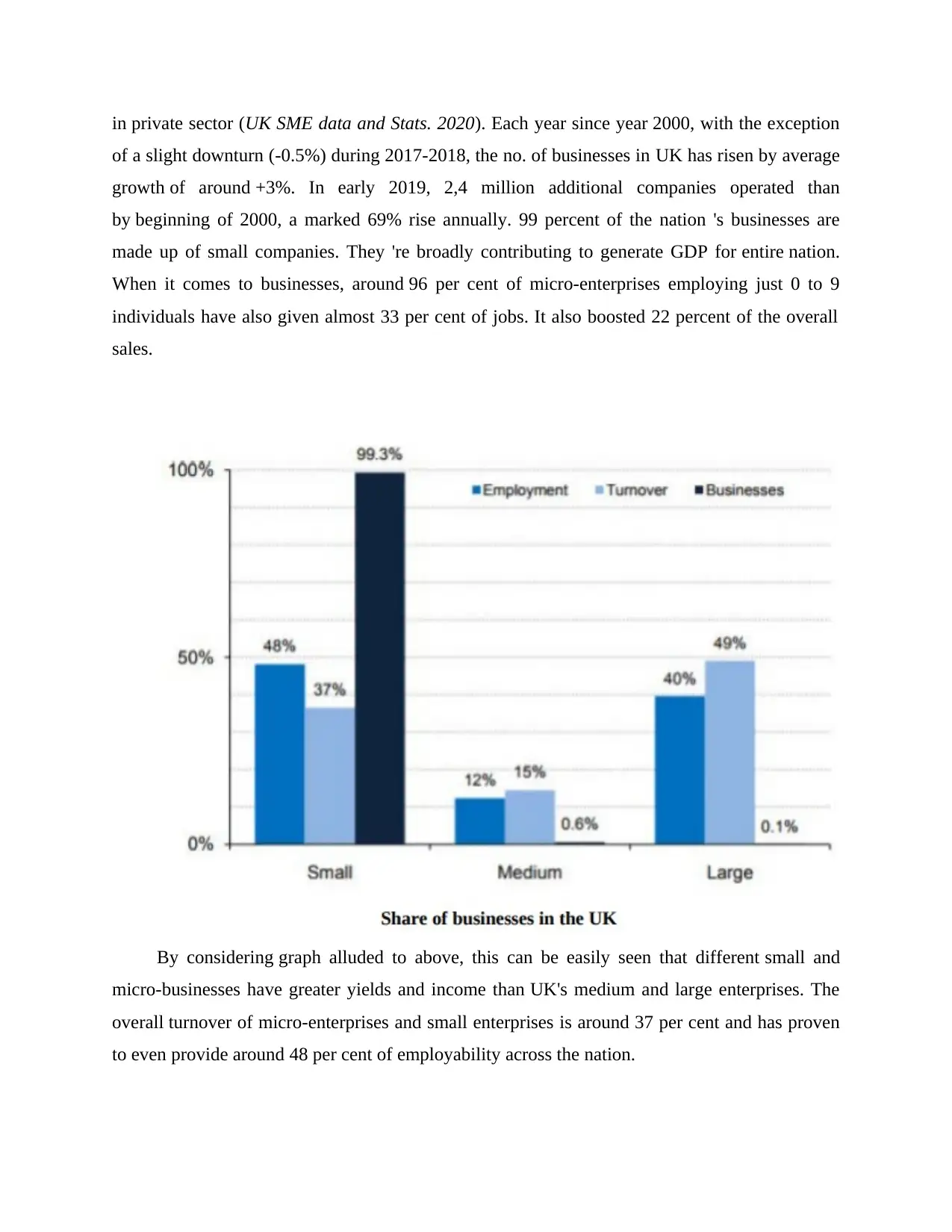
in private sector (UK SME data and Stats. 2020). Each year since year 2000, with the exception
of a slight downturn (-0.5%) during 2017-2018, the no. of businesses in UK has risen by average
growth of around +3%. In early 2019, 2,4 million additional companies operated than
by beginning of 2000, a marked 69% rise annually. 99 percent of the nation 's businesses are
made up of small companies. They 're broadly contributing to generate GDP for entire nation.
When it comes to businesses, around 96 per cent of micro-enterprises employing just 0 to 9
individuals have also given almost 33 per cent of jobs. It also boosted 22 percent of the overall
sales.
By considering graph alluded to above, this can be easily seen that different small and
micro-businesses have greater yields and income than UK's medium and large enterprises. The
overall turnover of micro-enterprises and small enterprises is around 37 per cent and has proven
to even provide around 48 per cent of employability across the nation.
of a slight downturn (-0.5%) during 2017-2018, the no. of businesses in UK has risen by average
growth of around +3%. In early 2019, 2,4 million additional companies operated than
by beginning of 2000, a marked 69% rise annually. 99 percent of the nation 's businesses are
made up of small companies. They 're broadly contributing to generate GDP for entire nation.
When it comes to businesses, around 96 per cent of micro-enterprises employing just 0 to 9
individuals have also given almost 33 per cent of jobs. It also boosted 22 percent of the overall
sales.
By considering graph alluded to above, this can be easily seen that different small and
micro-businesses have greater yields and income than UK's medium and large enterprises. The
overall turnover of micro-enterprises and small enterprises is around 37 per cent and has proven
to even provide around 48 per cent of employability across the nation.
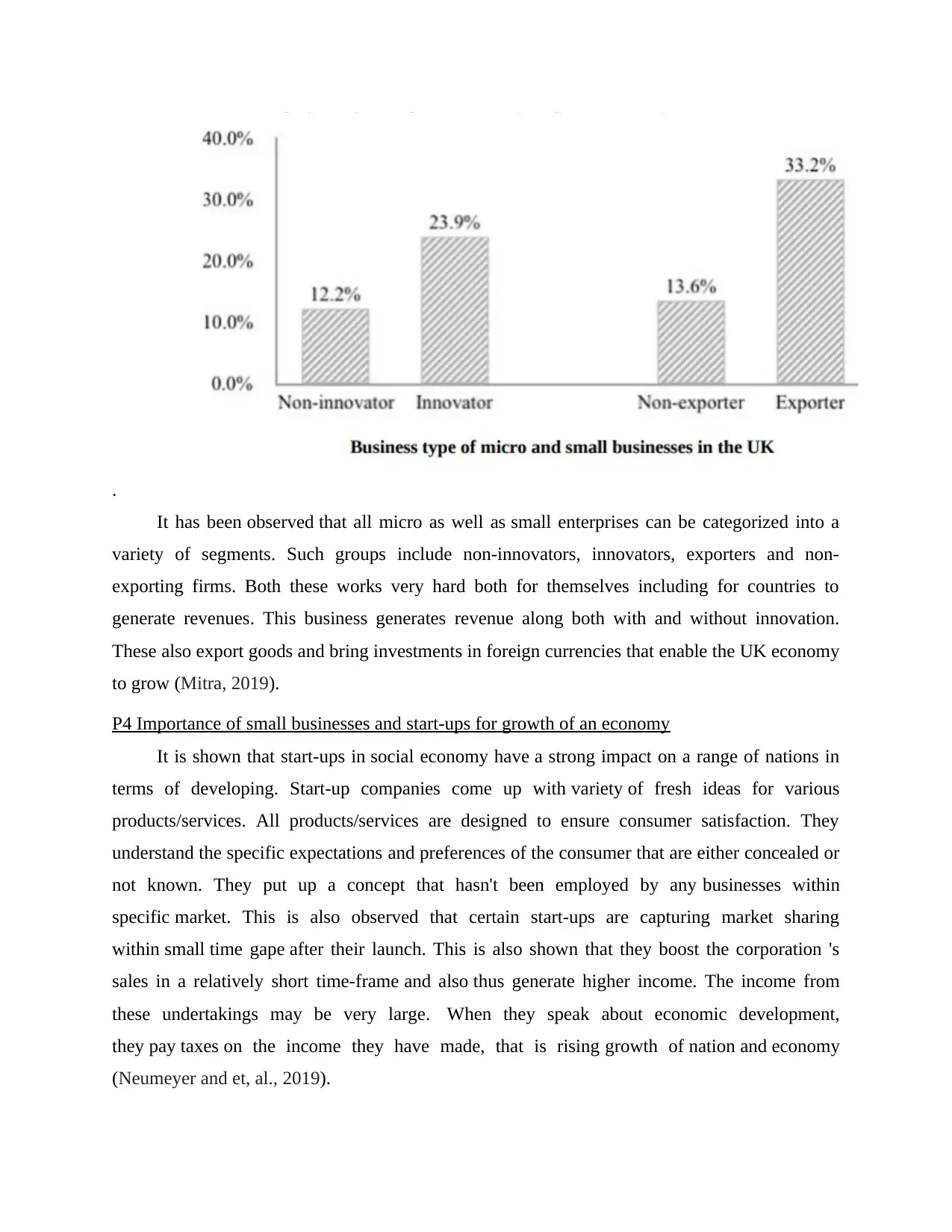
.
It has been observed that all micro as well as small enterprises can be categorized into a
variety of segments. Such groups include non-innovators, innovators, exporters and non-
exporting firms. Both these works very hard both for themselves including for countries to
generate revenues. This business generates revenue along both with and without innovation.
These also export goods and bring investments in foreign currencies that enable the UK economy
to grow (Mitra, 2019).
P4 Importance of small businesses and start-ups for growth of an economy
It is shown that start-ups in social economy have a strong impact on a range of nations in
terms of developing. Start-up companies come up with variety of fresh ideas for various
products/services. All products/services are designed to ensure consumer satisfaction. They
understand the specific expectations and preferences of the consumer that are either concealed or
not known. They put up a concept that hasn't been employed by any businesses within
specific market. This is also observed that certain start-ups are capturing market sharing
within small time gape after their launch. This is also shown that they boost the corporation 's
sales in a relatively short time-frame and also thus generate higher income. The income from
these undertakings may be very large. When they speak about economic development,
they pay taxes on the income they have made, that is rising growth of nation and economy
(Neumeyer and et, al., 2019).
It has been observed that all micro as well as small enterprises can be categorized into a
variety of segments. Such groups include non-innovators, innovators, exporters and non-
exporting firms. Both these works very hard both for themselves including for countries to
generate revenues. This business generates revenue along both with and without innovation.
These also export goods and bring investments in foreign currencies that enable the UK economy
to grow (Mitra, 2019).
P4 Importance of small businesses and start-ups for growth of an economy
It is shown that start-ups in social economy have a strong impact on a range of nations in
terms of developing. Start-up companies come up with variety of fresh ideas for various
products/services. All products/services are designed to ensure consumer satisfaction. They
understand the specific expectations and preferences of the consumer that are either concealed or
not known. They put up a concept that hasn't been employed by any businesses within
specific market. This is also observed that certain start-ups are capturing market sharing
within small time gape after their launch. This is also shown that they boost the corporation 's
sales in a relatively short time-frame and also thus generate higher income. The income from
these undertakings may be very large. When they speak about economic development,
they pay taxes on the income they have made, that is rising growth of nation and economy
(Neumeyer and et, al., 2019).
⊘ This is a preview!⊘
Do you want full access?
Subscribe today to unlock all pages.

Trusted by 1+ million students worldwide
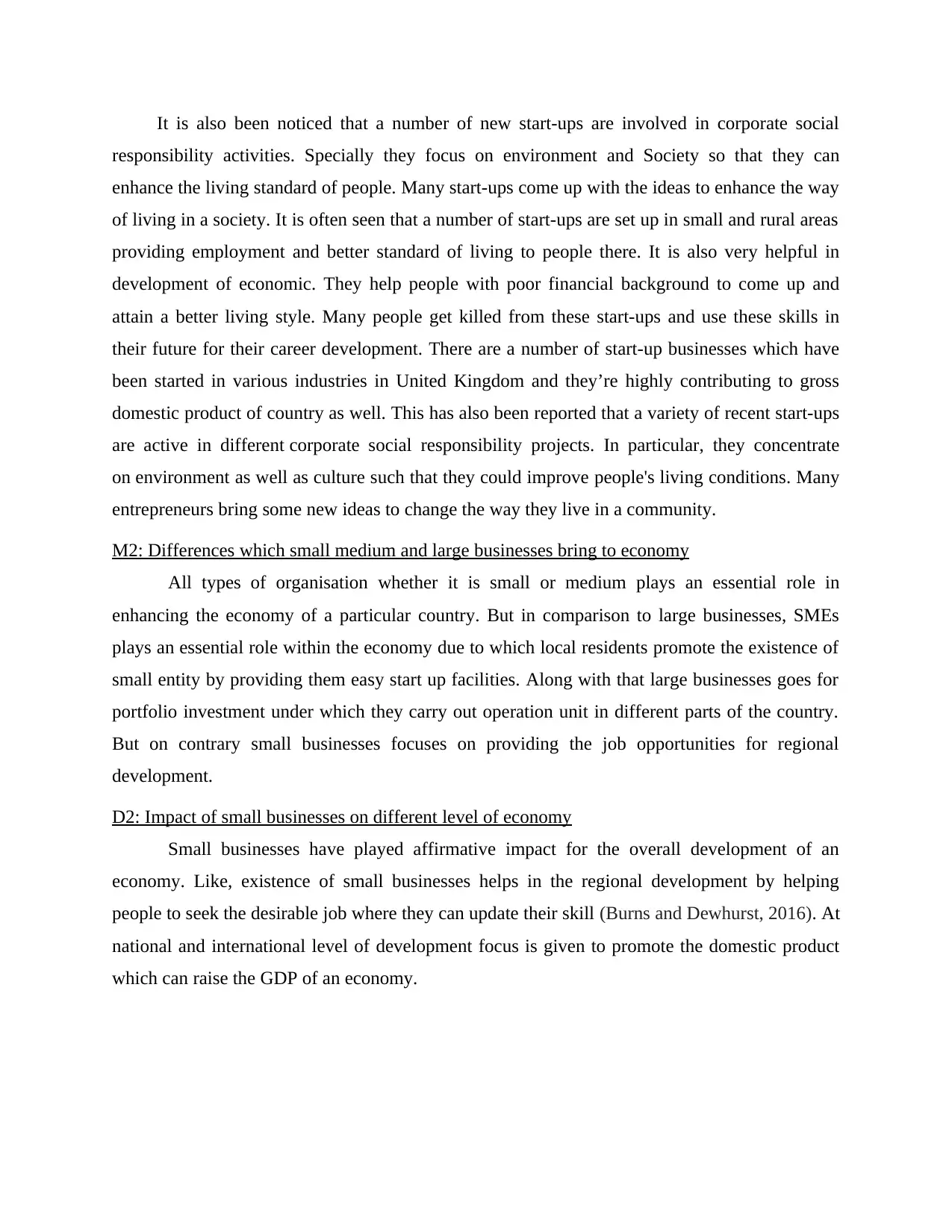
It is also been noticed that a number of new start-ups are involved in corporate social
responsibility activities. Specially they focus on environment and Society so that they can
enhance the living standard of people. Many start-ups come up with the ideas to enhance the way
of living in a society. It is often seen that a number of start-ups are set up in small and rural areas
providing employment and better standard of living to people there. It is also very helpful in
development of economic. They help people with poor financial background to come up and
attain a better living style. Many people get killed from these start-ups and use these skills in
their future for their career development. There are a number of start-up businesses which have
been started in various industries in United Kingdom and they’re highly contributing to gross
domestic product of country as well. This has also been reported that a variety of recent start-ups
are active in different corporate social responsibility projects. In particular, they concentrate
on environment as well as culture such that they could improve people's living conditions. Many
entrepreneurs bring some new ideas to change the way they live in a community.
M2: Differences which small medium and large businesses bring to economy
All types of organisation whether it is small or medium plays an essential role in
enhancing the economy of a particular country. But in comparison to large businesses, SMEs
plays an essential role within the economy due to which local residents promote the existence of
small entity by providing them easy start up facilities. Along with that large businesses goes for
portfolio investment under which they carry out operation unit in different parts of the country.
But on contrary small businesses focuses on providing the job opportunities for regional
development.
D2: Impact of small businesses on different level of economy
Small businesses have played affirmative impact for the overall development of an
economy. Like, existence of small businesses helps in the regional development by helping
people to seek the desirable job where they can update their skill (Burns and Dewhurst, 2016). At
national and international level of development focus is given to promote the domestic product
which can raise the GDP of an economy.
responsibility activities. Specially they focus on environment and Society so that they can
enhance the living standard of people. Many start-ups come up with the ideas to enhance the way
of living in a society. It is often seen that a number of start-ups are set up in small and rural areas
providing employment and better standard of living to people there. It is also very helpful in
development of economic. They help people with poor financial background to come up and
attain a better living style. Many people get killed from these start-ups and use these skills in
their future for their career development. There are a number of start-up businesses which have
been started in various industries in United Kingdom and they’re highly contributing to gross
domestic product of country as well. This has also been reported that a variety of recent start-ups
are active in different corporate social responsibility projects. In particular, they concentrate
on environment as well as culture such that they could improve people's living conditions. Many
entrepreneurs bring some new ideas to change the way they live in a community.
M2: Differences which small medium and large businesses bring to economy
All types of organisation whether it is small or medium plays an essential role in
enhancing the economy of a particular country. But in comparison to large businesses, SMEs
plays an essential role within the economy due to which local residents promote the existence of
small entity by providing them easy start up facilities. Along with that large businesses goes for
portfolio investment under which they carry out operation unit in different parts of the country.
But on contrary small businesses focuses on providing the job opportunities for regional
development.
D2: Impact of small businesses on different level of economy
Small businesses have played affirmative impact for the overall development of an
economy. Like, existence of small businesses helps in the regional development by helping
people to seek the desirable job where they can update their skill (Burns and Dewhurst, 2016). At
national and international level of development focus is given to promote the domestic product
which can raise the GDP of an economy.
Paraphrase This Document
Need a fresh take? Get an instant paraphrase of this document with our AI Paraphraser
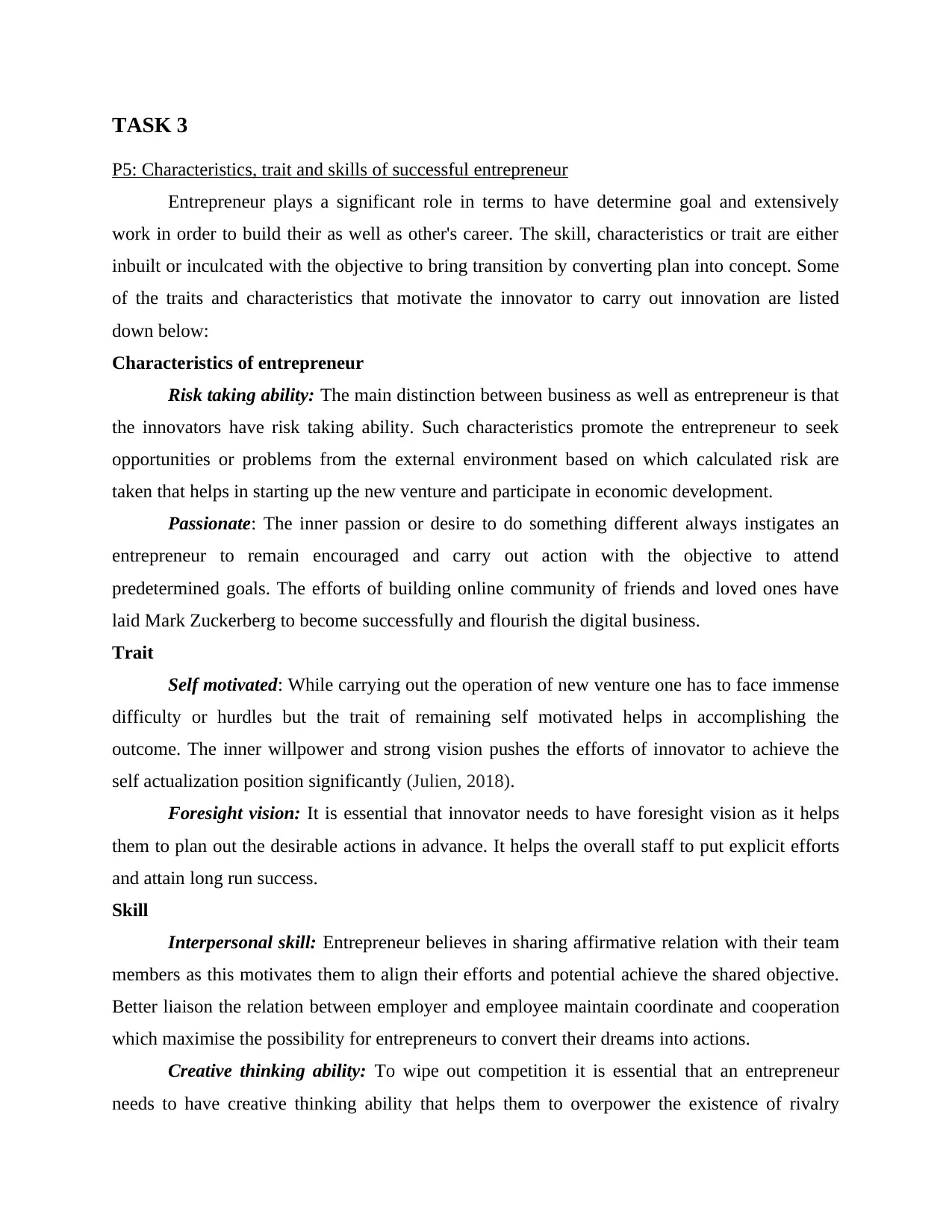
TASK 3
P5: Characteristics, trait and skills of successful entrepreneur
Entrepreneur plays a significant role in terms to have determine goal and extensively
work in order to build their as well as other's career. The skill, characteristics or trait are either
inbuilt or inculcated with the objective to bring transition by converting plan into concept. Some
of the traits and characteristics that motivate the innovator to carry out innovation are listed
down below:
Characteristics of entrepreneur
Risk taking ability: The main distinction between business as well as entrepreneur is that
the innovators have risk taking ability. Such characteristics promote the entrepreneur to seek
opportunities or problems from the external environment based on which calculated risk are
taken that helps in starting up the new venture and participate in economic development.
Passionate: The inner passion or desire to do something different always instigates an
entrepreneur to remain encouraged and carry out action with the objective to attend
predetermined goals. The efforts of building online community of friends and loved ones have
laid Mark Zuckerberg to become successfully and flourish the digital business.
Trait
Self motivated: While carrying out the operation of new venture one has to face immense
difficulty or hurdles but the trait of remaining self motivated helps in accomplishing the
outcome. The inner willpower and strong vision pushes the efforts of innovator to achieve the
self actualization position significantly (Julien, 2018).
Foresight vision: It is essential that innovator needs to have foresight vision as it helps
them to plan out the desirable actions in advance. It helps the overall staff to put explicit efforts
and attain long run success.
Skill
Interpersonal skill: Entrepreneur believes in sharing affirmative relation with their team
members as this motivates them to align their efforts and potential achieve the shared objective.
Better liaison the relation between employer and employee maintain coordinate and cooperation
which maximise the possibility for entrepreneurs to convert their dreams into actions.
Creative thinking ability: To wipe out competition it is essential that an entrepreneur
needs to have creative thinking ability that helps them to overpower the existence of rivalry
P5: Characteristics, trait and skills of successful entrepreneur
Entrepreneur plays a significant role in terms to have determine goal and extensively
work in order to build their as well as other's career. The skill, characteristics or trait are either
inbuilt or inculcated with the objective to bring transition by converting plan into concept. Some
of the traits and characteristics that motivate the innovator to carry out innovation are listed
down below:
Characteristics of entrepreneur
Risk taking ability: The main distinction between business as well as entrepreneur is that
the innovators have risk taking ability. Such characteristics promote the entrepreneur to seek
opportunities or problems from the external environment based on which calculated risk are
taken that helps in starting up the new venture and participate in economic development.
Passionate: The inner passion or desire to do something different always instigates an
entrepreneur to remain encouraged and carry out action with the objective to attend
predetermined goals. The efforts of building online community of friends and loved ones have
laid Mark Zuckerberg to become successfully and flourish the digital business.
Trait
Self motivated: While carrying out the operation of new venture one has to face immense
difficulty or hurdles but the trait of remaining self motivated helps in accomplishing the
outcome. The inner willpower and strong vision pushes the efforts of innovator to achieve the
self actualization position significantly (Julien, 2018).
Foresight vision: It is essential that innovator needs to have foresight vision as it helps
them to plan out the desirable actions in advance. It helps the overall staff to put explicit efforts
and attain long run success.
Skill
Interpersonal skill: Entrepreneur believes in sharing affirmative relation with their team
members as this motivates them to align their efforts and potential achieve the shared objective.
Better liaison the relation between employer and employee maintain coordinate and cooperation
which maximise the possibility for entrepreneurs to convert their dreams into actions.
Creative thinking ability: To wipe out competition it is essential that an entrepreneur
needs to have creative thinking ability that helps them to overpower the existence of rivalry
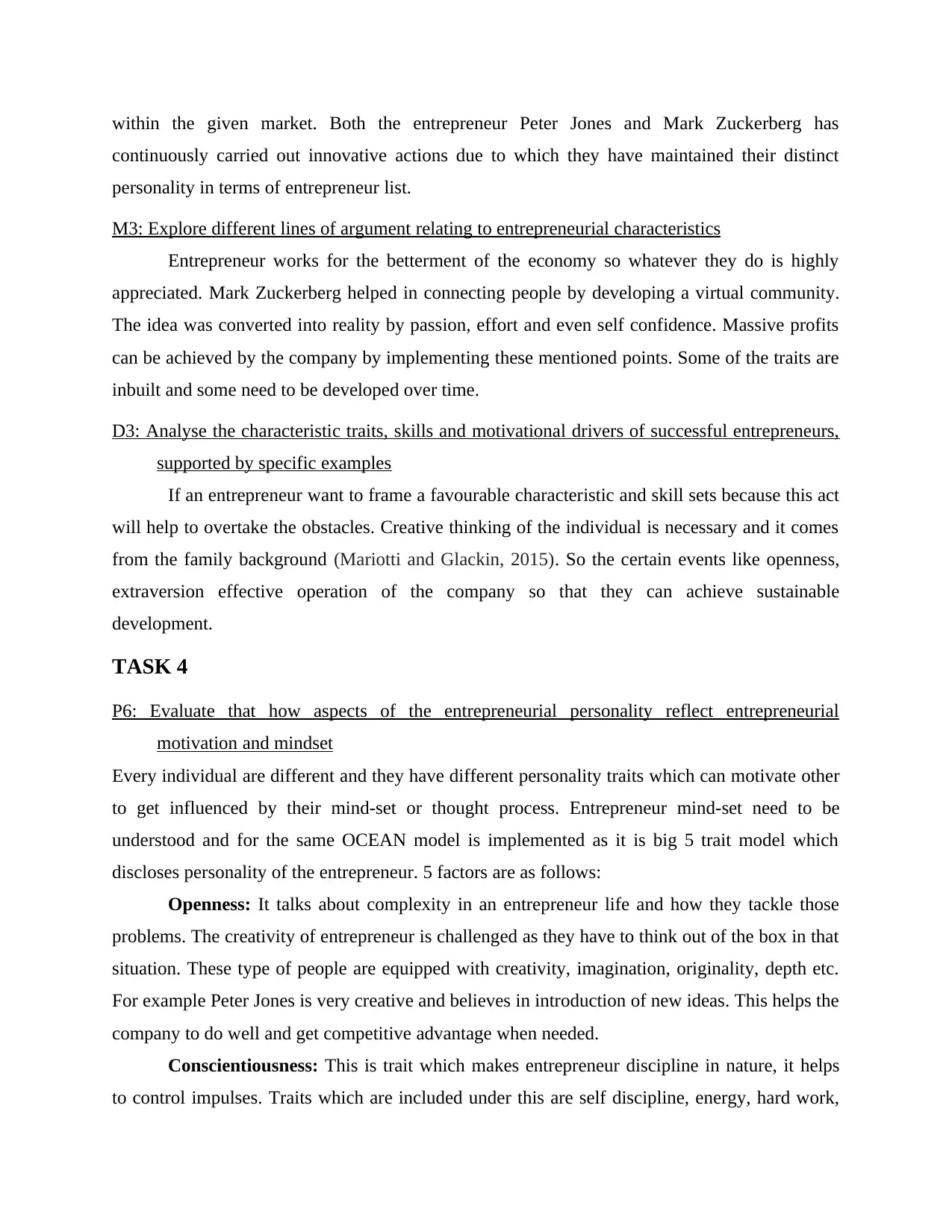
within the given market. Both the entrepreneur Peter Jones and Mark Zuckerberg has
continuously carried out innovative actions due to which they have maintained their distinct
personality in terms of entrepreneur list.
M3: Explore different lines of argument relating to entrepreneurial characteristics
Entrepreneur works for the betterment of the economy so whatever they do is highly
appreciated. Mark Zuckerberg helped in connecting people by developing a virtual community.
The idea was converted into reality by passion, effort and even self confidence. Massive profits
can be achieved by the company by implementing these mentioned points. Some of the traits are
inbuilt and some need to be developed over time.
D3: Analyse the characteristic traits, skills and motivational drivers of successful entrepreneurs,
supported by specific examples
If an entrepreneur want to frame a favourable characteristic and skill sets because this act
will help to overtake the obstacles. Creative thinking of the individual is necessary and it comes
from the family background (Mariotti and Glackin, 2015). So the certain events like openness,
extraversion effective operation of the company so that they can achieve sustainable
development.
TASK 4
P6: Evaluate that how aspects of the entrepreneurial personality reflect entrepreneurial
motivation and mindset
Every individual are different and they have different personality traits which can motivate other
to get influenced by their mind-set or thought process. Entrepreneur mind-set need to be
understood and for the same OCEAN model is implemented as it is big 5 trait model which
discloses personality of the entrepreneur. 5 factors are as follows:
Openness: It talks about complexity in an entrepreneur life and how they tackle those
problems. The creativity of entrepreneur is challenged as they have to think out of the box in that
situation. These type of people are equipped with creativity, imagination, originality, depth etc.
For example Peter Jones is very creative and believes in introduction of new ideas. This helps the
company to do well and get competitive advantage when needed.
Conscientiousness: This is trait which makes entrepreneur discipline in nature, it helps
to control impulses. Traits which are included under this are self discipline, energy, hard work,
continuously carried out innovative actions due to which they have maintained their distinct
personality in terms of entrepreneur list.
M3: Explore different lines of argument relating to entrepreneurial characteristics
Entrepreneur works for the betterment of the economy so whatever they do is highly
appreciated. Mark Zuckerberg helped in connecting people by developing a virtual community.
The idea was converted into reality by passion, effort and even self confidence. Massive profits
can be achieved by the company by implementing these mentioned points. Some of the traits are
inbuilt and some need to be developed over time.
D3: Analyse the characteristic traits, skills and motivational drivers of successful entrepreneurs,
supported by specific examples
If an entrepreneur want to frame a favourable characteristic and skill sets because this act
will help to overtake the obstacles. Creative thinking of the individual is necessary and it comes
from the family background (Mariotti and Glackin, 2015). So the certain events like openness,
extraversion effective operation of the company so that they can achieve sustainable
development.
TASK 4
P6: Evaluate that how aspects of the entrepreneurial personality reflect entrepreneurial
motivation and mindset
Every individual are different and they have different personality traits which can motivate other
to get influenced by their mind-set or thought process. Entrepreneur mind-set need to be
understood and for the same OCEAN model is implemented as it is big 5 trait model which
discloses personality of the entrepreneur. 5 factors are as follows:
Openness: It talks about complexity in an entrepreneur life and how they tackle those
problems. The creativity of entrepreneur is challenged as they have to think out of the box in that
situation. These type of people are equipped with creativity, imagination, originality, depth etc.
For example Peter Jones is very creative and believes in introduction of new ideas. This helps the
company to do well and get competitive advantage when needed.
Conscientiousness: This is trait which makes entrepreneur discipline in nature, it helps
to control impulses. Traits which are included under this are self discipline, energy, hard work,
⊘ This is a preview!⊘
Do you want full access?
Subscribe today to unlock all pages.

Trusted by 1+ million students worldwide
1 out of 15
Related Documents
Your All-in-One AI-Powered Toolkit for Academic Success.
+13062052269
info@desklib.com
Available 24*7 on WhatsApp / Email
![[object Object]](/_next/static/media/star-bottom.7253800d.svg)
Unlock your academic potential
Copyright © 2020–2026 A2Z Services. All Rights Reserved. Developed and managed by ZUCOL.




